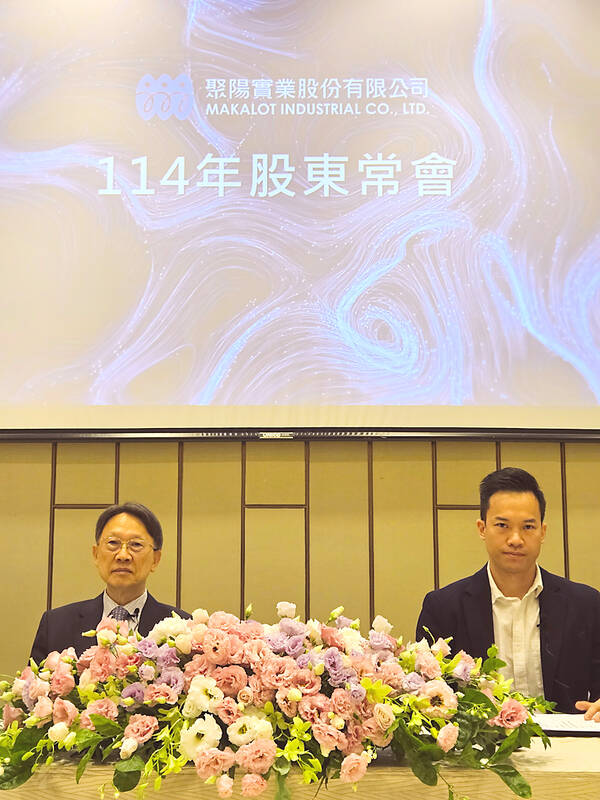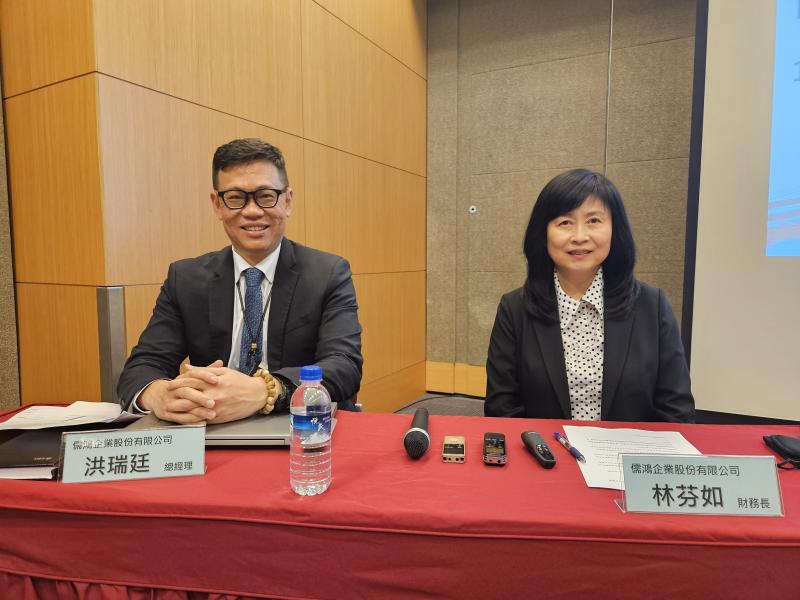Taiwan-based textile companies Eclat Textile Co (儒鴻) and Makalot Industrial Co (聚陽實業), which produce more than 80 percent of their goods in Vietnam and Indonesia, said they were somewhat relieved by the latest tariff rates imposed by the US on the two Southeast Asian countries.
On Tuesday, the administration of US President Donald Trump announced it had reached a deal to impose 19 percent tariffs on Indonesia-made products, down from the 32 percent it threatened in early April.
That came after the US reached an agreement with Vietnam early this month to impose a 20 percent tariff on goods from that country, down from 46 percent.

Photo: CNA
Eclat and Makalot said that tariffs in the 19-to-20 percent range were acceptable and that the increased costs were not game changers.
Tiffany Lin (林芬如), Eclat’s vice president of finance and accounting, told reporters that the tariff issues were evolving in a “positive” direction and that Eclat would negotiate pricing with its clients based on the new tariffs.
According to the company, which is believed to produce garments for international brands such as Nike, Under Armour and Lululemon Athletica, Vietnam accounts for up to 65 percent of its total production and Indonesia for 25 percent.

Photo: CNA
There had been speculation that Eclat was putting off new investments in Indonesia due to the very high tariff announced originally, but Lin said that Eclat’s overseas investments were proceeding as planned and were necessary for its expansion.
At the end of last month, the company announced that it would inject US$41 million in a rights issue proposed by its Indonesian subsidiary Eclat Textile International, paving the way for construction of a third facility in Indonesia.
Meanwhile, Makalot gets 42 percent of its total production from Indonesia and 38 percent from Vietnam, company spokesman Lin Heng-yu (林恆宇) said.
“With the two countries striking a deal with the United States, worries in my heart have been reduced by half,” Lin Heng-yu said.
Makalot would wait for the outcome of tariff negotiations with other US trading partners to be finalized before the company discusses with its clients how to share the financial burden of the tariff hikes, he said.
Outside the textile industry, Teco Electric & Machinery Co (東元), one of Taiwan’s leading electromechanical brands, also hailed the tariff arrangement for Indonesia, where the company produces power transformers.
Demand for power transformers from the US has remained solid and the lower tariff rate for Indonesia would make products rolled out by its Indonesia facility more competitive in the US market, Teco said.
The cost structure of its transformer facility in Indonesia is lower than that of counterparts in Taiwan, Japan and South Korea, it said.
In late September last year, Teco acquired a 57.2 percent stake in Taiwan-based power transformer maker Shenchang Electric Co (伸昌電機).
After the acquisition, the firm has set up a partnership with Shenchang’s Indonesian affiliate PT Sintra to expand its product portfolio in the Southeast Asian country with an eye toward North America and Taiwan, Teco said.

IN THE AIR: While most companies said they were committed to North American operations, some added that production and costs would depend on the outcome of a US trade probe Leading local contract electronics makers Wistron Corp (緯創), Quanta Computer Inc (廣達), Inventec Corp (英業達) and Compal Electronics Inc (仁寶) are to maintain their North American expansion plans, despite Washington’s 20 percent tariff on Taiwanese goods. Wistron said it has long maintained a presence in the US, while distributing production across Taiwan, North America, Southeast Asia and Europe. The company is in talks with customers to align capacity with their site preferences, a company official told the Taipei Times by telephone on Friday. The company is still in talks with clients over who would bear the tariff costs, with the outcome pending further

A proposed 100 percent tariff on chip imports announced by US President Donald Trump could shift more of Taiwan’s semiconductor production overseas, a Taiwan Institute of Economic Research (TIER) researcher said yesterday. Trump’s tariff policy will accelerate the global semiconductor industry’s pace to establish roots in the US, leading to higher supply chain costs and ultimately raising prices of consumer electronics and creating uncertainty for future market demand, Arisa Liu (劉佩真) at the institute’s Taiwan Industry Economics Database said in a telephone interview. Trump’s move signals his intention to "restore the glory of the US semiconductor industry," Liu noted, saying that

NEGOTIATIONS: Semiconductors play an outsized role in Taiwan’s industrial and economic development and are a major driver of the Taiwan-US trade imbalance With US President Donald Trump threatening to impose tariffs on semiconductors, Taiwan is expected to face a significant challenge, as information and communications technology (ICT) products account for more than 70 percent of its exports to the US, Chung-Hua Institution for Economic Research (CIER, 中華經濟研究院) president Lien Hsien-ming (連賢明) said on Friday. Compared with other countries, semiconductors play a disproportionately large role in Taiwan’s industrial and economic development, Lien said. As the sixth-largest contributor to the US trade deficit, Taiwan recorded a US$73.9 billion trade surplus with the US last year — up from US$47.8 billion in 2023 — driven by strong

STILL UNCLEAR: Several aspects of the policy still need to be clarified, such as whether the exemptions would expand to related products, PwC Taiwan warned The TAIEX surged yesterday, led by gains in Taiwan Semiconductor Manufacturing Co (TSMC, 台積電), after US President Donald Trump announced a sweeping 100 percent tariff on imported semiconductors — while exempting companies operating or building plants in the US, which includes TSMC. The benchmark index jumped 556.41 points, or 2.37 percent, to close at 24,003.77, breaching the 24,000-point level and hitting its highest close this year, Taiwan Stock Exchange (TWSE) data showed. TSMC rose NT$55, or 4.89 percent, to close at a record NT$1,180, as the company is already investing heavily in a multibillion-dollar plant in Arizona that led investors to assume